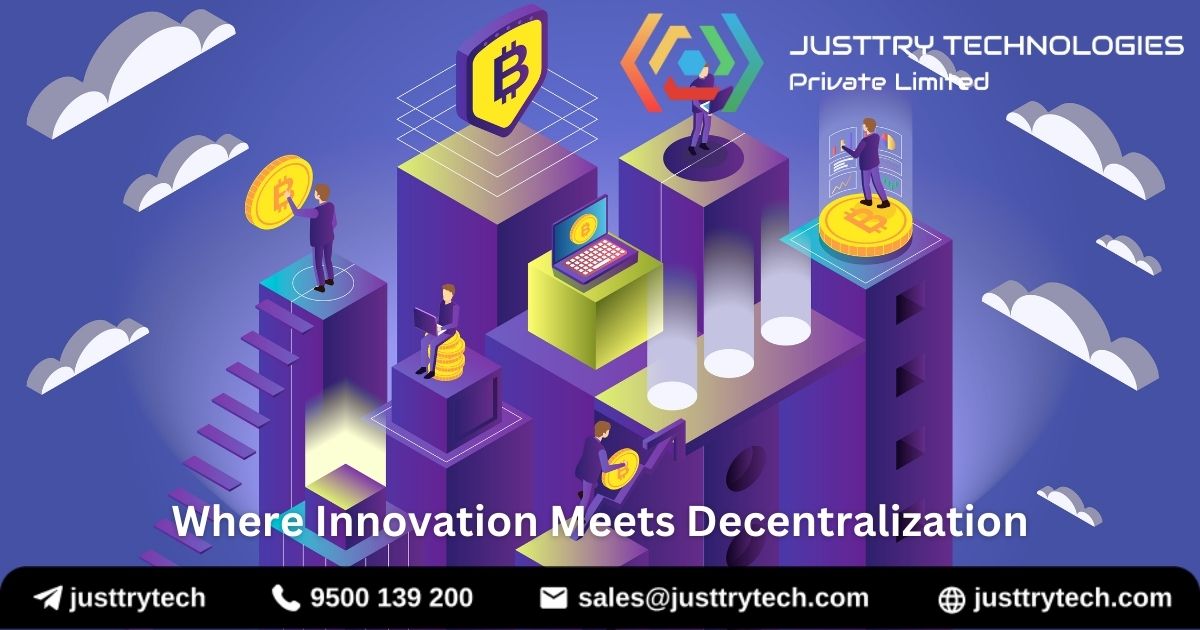The transformative power of blockchain technology has taken the tech world by storm, opening doors to innovation across industries such as finance, healthcare, supply chain, gaming, and more. For developers and businesses alike, diving into blockchain development isn’t just about coding—it’s about creating solutions that connect people, streamline processes, and redefine trust in the digital era.
In this blog, we’ll embark on a journey into the exciting world of blockchain development, explore its potential, and uncover how leveraging blockchain development services can help businesses stay ahead of the curve.
Understanding Blockchain Development
At its core, blockchain development involves creating decentralized applications (dApps), smart contracts, and distributed systems that leverage blockchain technology. Unlike traditional databases, blockchain is a decentralized ledger that records transactions across multiple nodes, offering unmatched security, transparency, and immutability.
Blockchain development spans a wide range of applications, from cryptocurrency platforms like Bitcoin and Ethereum to enterprise-grade solutions for healthcare, finance, and beyond.
Key Components of Blockchain Development
To start your blockchain journey, it’s essential to understand the building blocks of this technology:
1. Blockchain Networks
- Public Blockchains: Open to anyone; examples include Bitcoin and Ethereum.
- Private Blockchains: Restricted to a specific organization or group for internal use.
- Consortium Blockchains: Governed by multiple organizations, often used in industries like banking.
2. Smart Contracts
Smart contracts are self-executing code stored on a blockchain, triggered when specific conditions are met. They are integral to dApps and automate processes like payments, voting, and data sharing.
3. Decentralized Applications (dApps)
dApps run on blockchain networks and enable peer-to-peer transactions without intermediaries. Popular dApps include DeFi platforms, NFT marketplaces, and gaming ecosystems.
4. Cryptographic Security
Blockchain uses advanced cryptographic techniques to secure transactions and protect user data. Each transaction is encrypted and linked to the previous one, forming a tamper-proof chain.
The Need for Blockchain Development Services
While the potential of blockchain is immense, building a blockchain-based application from scratch can be challenging. Partnering with a professional blockchain development service can simplify the process and ensure a successful implementation.
Benefits of Blockchain Development Services:
- Expertise: Access to developers with in-depth knowledge of blockchain frameworks, tools, and best practices.
- Customization: Tailor-made solutions to meet your specific business requirements.
- Scalability: Robust systems designed to handle growth and evolving needs.
- Security: Implementation of advanced security protocols to protect your platform and users.
- Faster Deployment: Save time and resources by working with experienced professionals.
How to Start Your Blockchain Development Journey
Whether you’re a developer looking to build blockchain solutions or a business exploring blockchain adoption, here’s how to get started:
Step 1: Define Your Use Case
Identify the problem you want to solve with blockchain. Common use cases include:
- Financial services (e.g., payments, lending, DeFi platforms).
- Supply chain management for transparency and traceability.
- Healthcare data management for secure record-keeping.
- Gaming ecosystems with in-game assets powered by NFTs.
Step 2: Choose a Blockchain Platform
Select a blockchain platform that aligns with your project goals:
- Ethereum: Ideal for building dApps and smart contracts.
- Binance Smart Chain: Offers low transaction fees and fast processing.
- Solana: Known for scalability and speed.
- Hyperledger: Designed for enterprise applications.
Step 3: Learn Blockchain Programming
If you’re a developer, familiarize yourself with blockchain programming languages:
- Solidity: Used for Ethereum smart contracts.
- Rust: Popular for Solana development.
- Go (Golang): Commonly used for Hyperledger applications.
Step 4: Leverage Blockchain Development Tools
Tools like Truffle, Remix, and Ganache simplify blockchain development by providing frameworks for testing, deploying, and managing smart contracts.
Step 5: Partner with a Blockchain Development Service
For businesses without technical expertise, collaborating with a blockchain development service can help bring your vision to life efficiently.
Real-World Applications of Blockchain Development
1. Decentralized Finance (DeFi)
Blockchain enables DeFi platforms that provide financial services like lending, borrowing, and trading without intermediaries. Examples include Uniswap and Aave.
2. Supply Chain Transparency
Blockchain tracks the movement of goods across supply chains, ensuring authenticity and reducing fraud. Companies like IBM are using blockchain to revolutionize logistics.
3. Healthcare Solutions
Blockchain secures patient records, facilitates data sharing, and ensures compliance with regulations like HIPAA.
4. NFT Marketplaces
Non-fungible tokens (NFTs) have transformed the art and gaming industries, allowing creators to tokenize and sell unique digital assets.
5. Gaming Ecosystems
Blockchain enables gamers to own, trade, and monetize in-game assets, fostering a new era of player-driven economies.
Overcoming Challenges in Blockchain Development
While blockchain offers transformative potential, there are challenges to consider:
1. Scalability Issues
High transaction volumes can lead to network congestion. Solutions like Layer 2 scaling (e.g., Polygon) and sharding address this issue.
2. Regulatory Uncertainty
Blockchain regulations vary by country, creating compliance challenges. Working with legal experts can help navigate this landscape.
3. High Development Costs
Building blockchain applications can be expensive. Using pre-built frameworks and partnering with blockchain development services can reduce costs.
Future Trends in Blockchain Development
- Interoperability: Enhanced cross-chain compatibility will allow different blockchain networks to work seamlessly together.
- Green Blockchain Solutions: Energy-efficient consensus mechanisms like Proof of Stake (PoS) are replacing energy-intensive Proof of Work (PoW).
- Enterprise Blockchain Adoption: Industries like real estate, insurance, and government will continue integrating blockchain for efficiency and transparency.
- Web 3.0 Applications: Blockchain will play a key role in the development of decentralized internet applications, fostering greater user control and data ownership.
Conclusion
Blockchain development is more than just a technological trend—it’s a paradigm shift reshaping industries and creating new possibilities. Whether you’re coding smart contracts, building decentralized applications, or adopting enterprise-grade blockchain solutions, the potential for innovation is limitless.
By leveraging professional blockchain development services, businesses can accelerate their journey into the blockchain era, creating solutions that drive efficiency, transparency, and trust. Now is the time to build, innovate, and thrive in the ever-expanding world of blockchain.





Comments